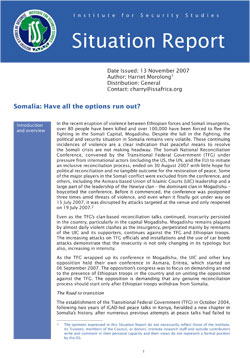Situation Report: Somalia - Have all the Options Run Out?, Harriet Morolong

In the recent eruption of violence between Ethiopian forces and Somali insurgents, over 80 people have been killed and over 100,000 have been forced to flee the fighting in the Somali Capital, Mogadishu. Despite the lull in the fighting, the political and security situation in Somalia remains very volatile. These continuing incidences of violence are a clear indication that peaceful means to resolve the Somali crisis are not making headway. The Somali National Reconciliation Conference, convened by the Transitional Federal Government (TFG) under pressure from international actors (including the US, the UN and the EU) to initiate an inclusive reconciliation process, ended on 30 August 2007 with little hope for political reconciliation and no tangible outcome for the restoration of peace. Some of the major players in the Somali conflict were excluded from the conference, and others, including the Asmara-based Union of Islamic Courts (UIC) leadership and a large part of the leadership of the Hawiye clan - the dominant clan in Mogadishu - boycotted the conference. Before it commenced, the conference was postponed three times amid threats of violence, and even when it finally got under way on 15 July 2007, it was disrupted by attacks targeted at the venue and only reopened on 19 July 2007.

